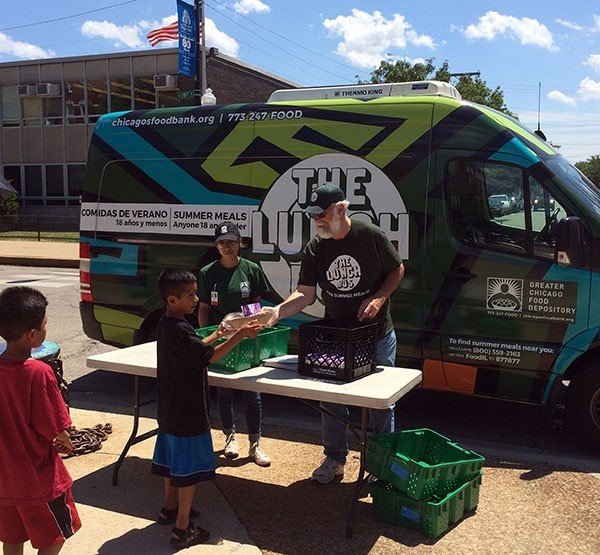Tech’s Philanthropy Gap
September 16, 2016
Dan Michelson has two hopes for the Greater Chicago Food Depository’s inaugural Hackathon to End Hunger.
One: That the expected 100 participants will, during 12 hours of hacking on Sept. 24, find a solution that helps erase childhood hunger. Before opening their laptops, participants will receive data on child food insecurity, community-level census data, historical numbers on summer and after-school meal participation rates and a briefing on childhood hunger. The big statistic: One in five children in Cook County is food-insecure, meaning without reliable access to enough affordable, nutritious food.
Two: That the hackathon will rally Chicago’s tech community around a cause outside its four walls. “The Chicago tech community to this point hasn’t come together as a single community around anything,” says Michelson, CEO of Strata Decision Technology in Chicago and co-chair of the hackathon steering committee.
 Photo by Greater Chicago Food Depository |
In 2015, 150 Strata employees spent a half-day volunteering at the food depository, which in the past year distributed 70 million pounds of food to people in Cook County. Michelson walked away impressed. “The way they’ve scaled it is stunning,” he says. “We thought, ‘Wow, that’s a good mission.’ ”
That year, Kate Maehr, CEO of the food depository, asked several executives including Michelson to form a committee to engage the tech sector. Michelson volunteered to co-chair; he formed a smaller group, which dreamed up the hackathon. David Snyder, publisher of Crain’s Chicago Business, was involved in initial discussions, and Crain’s is a sponsor of the event.
The tech industry here is “a group of individuals who are creative problem solvers,” Maehr says. Hunger “is first and foremost a problem to be solved and with creative solutions.”
The food depository has successfully rallied other industries to the cause: The Chicago Commercial Real Estate Awards dinner, established in 1989, has raised more than $16.5 million and become the food depository’s largest annual fundraising event.
 Photo by Greater Chicago Food Depository The Greater Chicago Food Depository hopes to harness the tech industry’s power to help solve childhood hunger. One in five Cook County kids is food-insecure, according to the organization. In the past year, the depository distributed 70 million pounds of food to people in Cook County. |
The tech community in Chicago can’t be accused of charitable stinginess.
Eric Lefkofsky, co-founder and former chair of Groupon, and his wife, Liz, have given millions of dollars to arts, cultural and education groups. He is the sole Chicago-area person on the list of the nation’s top tech philanthropists published by Inside Philanthropy. Lefkofsky and business partner Brad Keywell have signed the Giving Pledge, through which billionaires promise to give the bulk of their net worth to philanthropy.
Still, lots of garden-variety tech-sector fundraising goes straight back to the tech community to nurture talent, startups and other tools essential to cultivating a growing sector. That, some observers say, is one reason it’s behind the curve on philanthropy.
“If you look at a lot of really big philanthropists, you see big banks, big law firms; but those industries have been around for a lot longer than the tech movement,” says Luke Tanen, executive director of the Chicago Innovation Awards, a nonprofit whose last Un-Gala raised $125,000 to support its own tech-related programs. “The (tech) scene is growing and evolving,” he says. “It’s still figuring out how to interact with the philanthropic world in Chicago.”
Another observer points to the lack of tech-created “permanent capital” in the Chicago area. “VC funds are younger here. There are fewer billion-dollar companies and fewer men and women who have made (millions) over their careers,” says Jeremie Bacon, co-founder of Synap Software Labs in Chicago. “You have to have permanent capital to play with, and we don’t have that.”
On Aug. 25, Bacon hosted the inaugural Chicago Tech Rocks, which drew 500 people and grossed $125,000 for tech-related nonprofits, among them I.C. Stars, which provides tech training for low-income adults. Bacon expects Chicago Tech Rocks to be annual and continue to fund tech-related causes.
Another reason for the low philanthropic profile: the millennials who make up much of the tech workforce. “What we’re getting tripped up on in the nonprofit community is the methodology of contacting and engaging them,” says Lisa Dietlin, founder of the Institute of Transformational Philanthropy in Chicago, citing the group’s transience and reliance on social media. The group “definitely wants to get involved,” she says, and responds better to requests from peers than to general solicitations.
That’s why the hackathon makes sense, Michelson says. “Tech companies are able to scale in an extraordinary way. The opportunity to now catalyze that community, get them thinking and acting as one, has a long tail.”
Tackling childhood hunger, he says, is only the beginning.